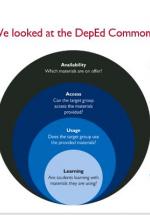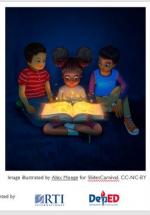Pouezevara, S.
Le rôle de l'écriture cursive dans l'éducation préscolaire des communautés linguistiques non dominantes au Sénégal

Cette brève revue de la littérature examine l'expérience mondiale en matière d'enseignement de l'écriture cursive au début de l'école primaire, ainsi que les avantages et les inconvénients que cela peut présenter pour l'acquisition de la littératie. Elle a été préparée dans le cadre du programme RELIT du Sénégal afin de conseiller le ministère de l'Éducation sur la manière de procéder à l'élaboration du programme d'enseignement de la langue nationale et à la rédaction des manuels scolaires. //
This brief literature review looks at global experience with teaching cursive writing in early primary school, and the advantages and disadvantages that this may have on literacy acquisition. It was prepared as part of the Senegal RELIT program to advise the Ministry of Education on how to proceed with national language curriculum and textbook development.

La quête du Sénégal pour améliorer les résultats d'apprentissage dans l'alphabétisation fondamentale bilingue

Ce blog a été écrit et publié à l'origine par la Fondation Bill et Melinda Gates et la CONFENMEN à l'occasion de la conférence « Apprendre pour Demain » à Dakar, au Sénégal (janvier 2025). Il a été publié sur le site web de la conférence (https://linktr.ee/apprendrepourdemain) et dans le répertoire de documents (https://sites.google.com/view/apprendrepourdemain/resources-ressources/others?authuser=3). Cet article décrit comment l'activité « Renforcement de la Lecture Initiale pour Tous » (RELIT, 2021-2026) de l'USAID s'est efforcée de renforcer la capacité du système éducatif à dispenser un enseignement bilingue dans les premières années de la scolarité, en s'appuyant sur une pédagogie structurée et le renforcement des capacités institutionnelles.

Senegal’s Quest for Improved Learning Outcomes in Bilingual Foundational Literacy

This blog was written for and originally published by the Bill and Melinda Gates Foundation and CONFENMEN on the occasion of the "Apprendre pour Demain" conference in Dakar, Senegal (January 2025). It was published on the conference website (https://linktr.ee/apprendrepourdemain) document repository (https://sites.google.com/view/apprendrepourdemain/resources-ressources/others?authuser=3). This article describes how USAID's “Renforcement de la Lecture Initiale pour Tous” (RELIT, 2021-2026) activity has been working to strengthen the education system’s capacity to deliver bilingual education in the early grades, with structured pedagogy and institutional capacity-building as central pillars.

Characteristics of Select Philippine Mother Tongue Languages Used in Basic Education Teaching and Learning (USAID ACR Asia)

This reference document is a companion to the Language Complexity Study conducted by RTI International under the All Children Reading–Philippines project in 2020. The study was a secondary analysis of Early Grade Reading Assessment (EGRA) data at multiple time points, looking specifically at the effect of language complexity on reading acquisition of second and third languages (L2 and L3, respectively). The study used the 2013 and 2019 National EGRA data sets to analyze performance according to categories of language complexity based on syllabic complexity, orthographic depth, and other related items. The study was guided by the methodology described by Brunette et al. (2019), who studied the effects of language complexity on reading outcomes in Uganda. The languages selected for analysis were those among the officially supported mother tongue (MT) languages of instruction in the Philippines. Analysts assessed whether the level of complexity was in any way predictive of the average increase or decrease in L2 and L3 scores across schools as measured in 2019 (provided there were schools that reported using MT in 2019, which was not the case for three of the languages: Chavacano, Ivatan, and Sambal.
The Role of Mother Tongue Language Complexity in Determining L2 and L3 Reading Outcomes in the Philippines (USAID ACR Asia)

This study uses national Grade (G) 3 Early Grade Reading Assessment (EGRA) data from 2013, when G3 students learned to read in Filipino and English rather than a mother tongue, and comparable data from 2019, when G3 students would have, according to policy, first learned to read in their mother tongue. The data were used to better understand the role of L1 complexity in L2 and L3 reading acquisition. Sample: 241 schools; 232 schools were the same in 2013 and 2019. Final sample used for analysis: 2,264 G3 students in 2019 and 2,267 G3 students in 2013. Children were assessed in Filipino (L2) and English (L3). Secondary analysis of the data set looked at reading performance and changes in reading performance according to language complexity.
Formative Evaluation of the DepEd Commons

DepEd ICTS requested support from the USAID/All Children Reading Philippines activity for evaluating the recently-launched DepEd Commons online resource portal to ensure that it could live up to its potential as a key strategy for giving all Filipino learners access to educational resources. In response to this request, RTI in collaboration with the DepEd ICTS EdTech Unit, designed a process for reviewing the DepEd Commons to identify evidence-based recommendations for a fully sustainable and impactful DepEd Commons. Although we use the term ‘evaluation’, this is a formative exercise, recognizing that the platform is in a nascent stage and would benefit most from forward-looking and actionable recommendations for living up to its potential, not a backward-looking judgment of implementation quality or completeness at a certain point in time. In line with the approach stated above—that the evaluation of the DepEd Commons would be a formative exercise designed to provide actionable recommendations for improvement, given the early stage of development of the platform—we chose a SWOT analysis methodology to frame the exercise. SWOT analyses are conducted to identify strengths, weaknesses, opportunities, and threats. The study team carried out key informant interviews with stakeholders from the implementing department in DepEd and in other departments with similar systems; a quantitative analysis of platform statistics containing usage data; and a self-administered survey focusing on usage and usability of the platform.

All Children Reading - Philippines: Project Background Brief

ACR–Philippines falls under All Children Reading–Asia, a broader program implemented by RTI International across multiple countries in the Asia Region. The activities directly contribute to USAID’s education goal to improve early grade reading (EGR) skills for 100 million children worldwide. There are two main areas of activity in support of the overall goals and objectives: EGR instruction and assessment in support of mother-tongue based multilingual education (MTB-MLE), and the use of educational technologies to support improved instruction in early grade reading, especially during school closures. Key achievements and activities through July 2021 are summarized in these briefs--one broad and one specific to the COVID-19 response.

Remote Learning in the Philippines During COVID [Briefs Series]

The Remote Learning Study was conducted during the 2020–2021 school year to investigate how mother-tongue-based multilingual education reading instruction proceeded in 20 schools around the country while classrooms were closed. The school head, 2 teachers, and 4 home learning partners from each school in Grades 1 and 3 were interviewed to gain insights on school administration, teaching and learning, and the home environment. Data was collected at three time points—November, March and June—from 20 school heads, 37 teachers of and 79 parents. Not all respondents were available at each time point. No parents were interviewed in November as recruitment was still underway. Children were also asked to fill out a literacy assessment worksheet, but very few parents returned this worksheet at each occasion. These briefs describe essential themes that emerged from this activity. #1 - Strategies for Assisting Home Learning Partners, #2 - Use of Teaching and Learning Materials, #3 - Use of Technology, #4 - Student Engagement Strategies, #5 - Challenges and Solutions to Remote Learning, #6 - School Leadership, #7 - Literacy Instructional Practice.

DepEd Commons and dissemination of eResources: a SWOT analysis [Presentation]

This presentation was delivered at the 2021 mEducation Alliance Symposium in a panel on the subject of education technologies for basic education in the Philippines.

Developing eResources for Early Literacy and Numeracy [Presentation]

This presentation was delivered at the 2021 mEducation Alliance Symposium in a panel on the subject of education technologies for basic education in the Philippines.

